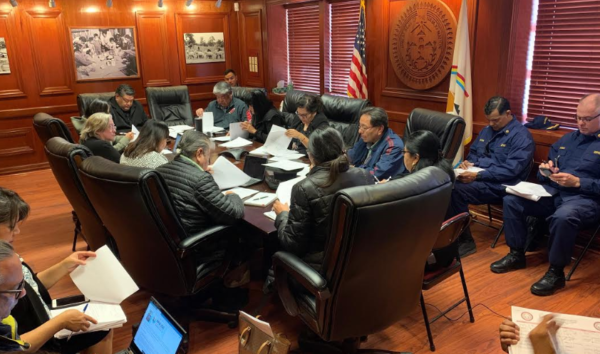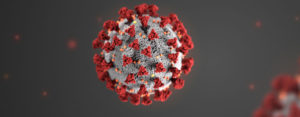
- Details
- By Press Releases
From Press Release
WINDOW ROCK, Ariz. — Navajo Nation President Jonathan Nez and Vice President Myron Lizer officially established the Navajo Nation COVID-19 Preparedness Team on Thursday, to monitor, plan, prepare, and coordinate precautionary efforts to address the coronavirus (COVID-19).
The Navajo Department of Health reported that there are currently no cases of the coronavirus on the Navajo Nation.
“Working together with the Navajo Department of Health, Bureau of Indian Education, Indian Health Service, state and local health departments, we are taking this proactive measure of establishing the Navajo Nation COVID-19 Preparedness Team to continue raising public awareness and to plan and prepare for the potential spread of the coronavirus in our region. We’re bringing these entities together to ensure that we are communicating and coordinating efforts to educate the public. There are no cases of the coronavirus on the Navajo Nation, but this is a very serious health concern, and it’s vital that we continue to provide information with everyone, including students, elderly, and community members,” President Nez said.

The Navajo Nation COVID-19 Preparedness Team includes the Office of the President and Vice President, Navajo Department of Health, Navajo Nation Division of Public Safety, Navajo Nation Division of Social Services, Navajo Nation Department of Emergency Management, Department of Diné Education, Navajo Nation Division of Community Development, U.S. Indian Health Service, U.S. Bureau of Indian Affairs, and the U.S. Bureau of Indian Education.
On Thursday, President Nez called for a meeting with the Navajo Department of Health and the Navajo Area Indian Health Service Director Roselyn Tso, where he stressed the need to utilize Community Health Representatives to inform Navajo elderly people and those living in remote areas, and to coordinate with hospitals and clinics.
Symptoms of the virus may include mild to severe respiratory illness with fever, cough, and shortness of breath, and is known to spread person-to-person. It can take up to 2 to 14 days for the virus to become active after exposure. Currently, there is no vaccine available for the virus, according to the Centers for Disease Control and Prevention (CDC). According to the CDC, “For the general American public, who are unlikely to be exposed to this virus at this time, the immediate health risk from coronavirus is low.”
On Feb. 20, 2020, President Nez and Navajo Department of Health Executive Director Dr. Jill Jim participated in a two-hour public radio forum on KTNN, to provide updates and prevention tips related to the coronavirus. On Feb. 3, 2020, the Navajo Department of Health established an internal coronavirus workgroup, which is now part of the Navajo Nation COVID-19 Preparedness Team.
“The number one priority is the health of our Navajo people. As the coronavirus, we ask for everyone’s help to inform your family and friends. As you go about your daily routines and especially when you travel, please take precautions,” stated Vice President Lizer.
The World Health Organization encourages people to avoid close contact with others showing symptoms of respiratory illness, such as coughing and sneezing, and to wash your hands with warm water and soap often, stay home if you are sick, and to minimize long-distance travel. The coronavirus has the potential to become severe. Severe cases can also lead to pneumonia, kidney failure, and in some cases, death. The most vulnerable are the elders, young children, and those with compromised immune systems.
The Nez-Lizer Administration will continue to coordinate with the county, state, and federal officials to monitor the evolving impacts of the coronavirus and continue to encourage the public to take precautions. For updates, please visit the Centers for Disease Control and Prevention at https://www.cdc.gov/coronavirus/2019-ncov/index.html.
More Stories Like This
Native News Weekly (August 25, 2024): D.C. BriefsNavajo Nation Mourns the Passing of Former Vice President Rex Lee Jim
Deb Haaland Earns Endorsement From Communications Workers of America Local 7076
University Soccer Standout Leads by Example
Two Native Americans Named to Democratic Congressional Campaign Committee's“Red to Blue” Program
Help us defend tribal sovereignty.
At Native News Online, our mission is rooted in telling the stories that strengthen sovereignty and uplift Indigenous voices — not just at year’s end, but every single day.
Because of your generosity last year, we were able to keep our reporters on the ground in tribal communities, at national gatherings and in the halls of Congress — covering the issues that matter most to Indian Country: sovereignty, culture, education, health and economic opportunity.
That support sustained us through a tough year in 2025. Now, as we look to the year ahead, we need your help right now to ensure warrior journalism remains strong — reporting that defends tribal sovereignty, amplifies Native truth, and holds power accountable.
 The stakes couldn't be higher. Your support keeps Native voices heard, Native stories told and Native sovereignty defended.
The stakes couldn't be higher. Your support keeps Native voices heard, Native stories told and Native sovereignty defended.
Stand with Warrior Journalism today.
Levi Rickert (Potawatomi), Editor & Publisher
